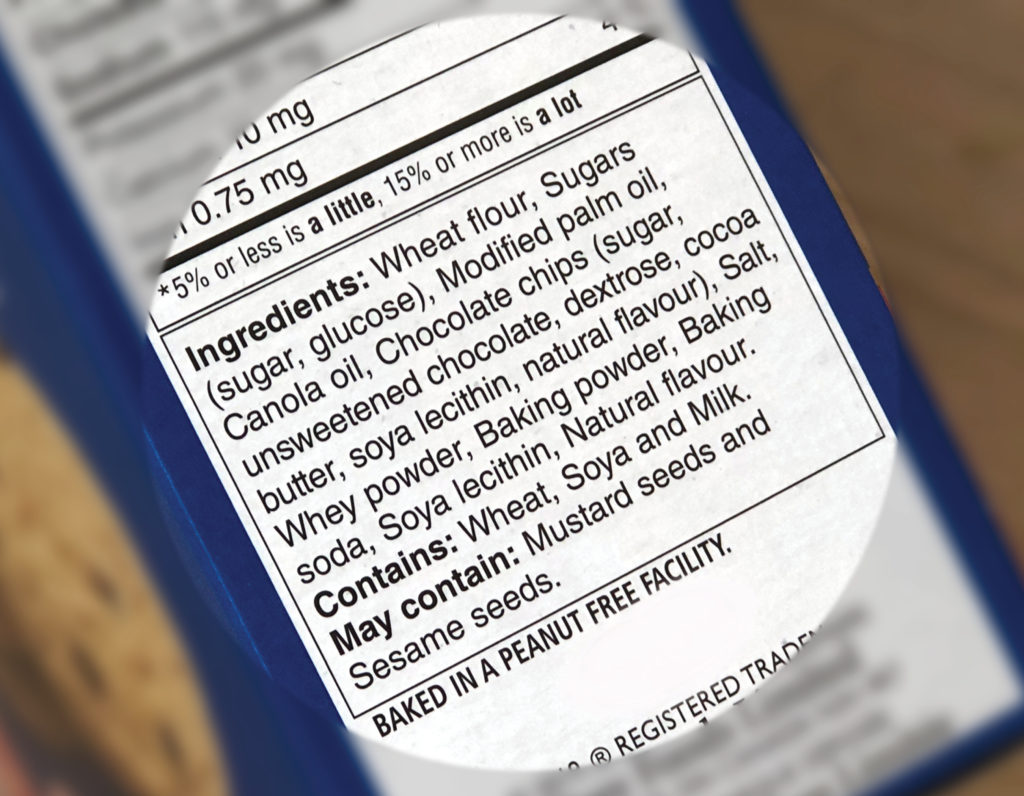Read about the U.S. FDA announcement and find out if it impacts Canadians, learn about the new Saskatchewan policy for schools. Participate in research and have your say, including a study on the psychosocial impact of having kids with food allergy and a study on the costs of living with food allergy during COVID-19. Plus, check out our latest mythbuster!
Advocacy: U.S. FDA announcement – temporary policy regarding certain food labelling requirements during COVID-19

There has been recent media coverage on the US Food & Drug Agency (FDA) announcement allowing food manufacturers to make temporary labelling changes on certain ingredients for some prepackaged food products. This policy has raised questions around the labelling of ingredients, although it does not allow for any ingredient labelling changes when it comes to the priority allergens in the U.S.
In order to understand if Canadians are impacted by this temporary U.S. policy, we reached out to Health Canada and the U.S. FDA for further clarity. We want to let you know that these temporary measures do not apply to prepackaged food products manufactured in the U.S. that are exported to Canada. All prepackaged foods meant for sale in Canada from the U.S. and all other countries, are required to meet Health Canada’s current food labelling laws.
If you have any questions about specific food products, please contact the manufacturer directly.
We will continue to follow this issue and will update you if there are any further changes.
Advocacy: New policy statement supporting Saskatchewan students with medical conditions

The Saskatchewan government has released a policy statement on supporting K-12 students with potentially life-threatening medical conditions at school. The new statement complements the previously issued policy advisory from the Saskatchewan School Boards Association.
Effective May 2020, the policy statement requires school divisions and the Conseil des écoles fransaskoises to develop, update and implement procedures related to dealing with students who have medical conditions such as allergies, asthma, diabetes and epilepsy.
These administrative procedures must identify how school divisions are to:
- act in specific circumstances related to managing students’ medical conditions;
- provide professional development for staff to handle specific circumstances;
- maintain records and transition plans for students with a medical condition(s).
It is also recommended that the administrative procedures address best practices, such as outlining the terms related to a medical condition, signs and symptoms, potential triggers, and the need to respond appropriately to a medical incident or life-threatening emergency.
We, along with parents of children with food allergy, including members of our Saskatchewan-based support groups, participated in the consultation process for the new policy statement. This gave us the opportunity to provide perspective on living with the condition and ensure the needs of students with food allergy remain a priority. Information about the policy statement is available in English and French.
If you’re in Saskatchewan, let us know how the new policy statement has changed/will change the management of food allergy at your school. Contact us at info@foodallergycanada.ca.
Research: Have your say! Participate in research to help make an impact on future policies and actions

Please take a moment to learn about these studies and participate before they close this month. If you have already participated, thank you!
Your participation in these studies provides the researchers and our organization with insights for better supporting families managing food allergy. Plus, as a special bonus, you can enter a draw to win a $100 VISA gift card for one of the studies below!
If you are a parent of a child with food allergy:

Food allergy IMPACT psychosocial study – closes on Monday, June 8th: Participate in a study that will allow researchers to better understand the parental experience of having a child/children with food allergy and the psychosocial impacts of this medical condition.
Your input is vital to providing the researchers, and patient organizations like ours, with insight needed to better support families managing food allergy anxiety. Plus, as a special bonus, you can enter to win a $100 VISA gift card when you complete the survey!
We need as many people as possible to complete this survey to have meaningful results. Please take the survey now and share with others. If you have already participated, thank you!
Individuals and families impacted by food allergy:

Costs of living with food allergy during COVID-19 – closes Tuesday, June 30th: Participate in a research study about food allergy and the impacts of the COVID-19 pandemic.
Your input is critical in helping us and the researchers understand the impacts of COVID-19 during the first wave. The results of this study will help inform strategies and policies for managing food allergy in advance for potential future waves of this pandemic. Help to ensure we gain meaningful insight, participate and share with others.
If you have peanut, tree nut, egg and/or milk allergy, or have children with one of these specific food allergies:

Chocolate consumption and food allergy – closes on Sunday, June 7th: Participate in a study on the use of precautionary allergen labelling (e.g. “may contain” statements) on certain chocolate products in Canada, and the related consumption habits of consumers with food allergy. Your input will help us advance the dialogue on precautionary allergen labelling in Canada.
This research is being conducted by Laval University in Quebec.
Mythbuster – Can avoiding allergenic foods during pregnancy and breastfeeding prevent food allergy in your baby?

FACT: Women do not need to avoid certain allergenic foods during pregnancy or breastfeeding according to current research. There is no evidence that avoidance prevents food allergy in babies.
Bottom line: Research does not support avoiding allergenic foods during pregnancy and breastfeeding to prevent food allergy in babies.

Learn more about breastfeeding in our Ask the allergist with Dr. Julia Upton. If you have concerns about food allergy and breastfeeding, please speak with an allergist.
Have questions on early introduction of allergens to babies, during COVID-19 and in general? Check out our early introduction section, and the CPS guidance on early introduction during the pandemic.
Help us educate your communities and share this Mythbuster with them! Find more mythbusters at foodallergycanada.ca/mythbusters.
Content is based on information included in our Food allergy myths webinar by Dr. Susan Waserman, MSc, MD, FRCPC.
Tags: call for participation, Have your say!, mythbuster, Research, Saskatchewan
